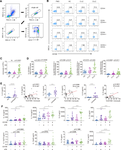Clinical and Experimental Medicine ( IF 3.2 ) Pub Date : 2024-02-28 , DOI: 10.1007/s10238-024-01305-3
Lichen Xu 1 , Chunhong Huang 2 , Xiaoping Zheng 3 , Hainv Gao 4 , Sainan Zhang 4 , Mengfei Zhu 4 , Xiahong Dai 4 , Gang Wang 5 , Jie Wang 1 , Haolu Chen 1 , Haihong Zhu 6 , Zhi Chen 6

|
Systemic inflammation is related to disease progression and prognosis in patients with advanced cirrhosis. However, the mechanisms underlying the initiation of inflammation are still not fully understood. The role of CD169+ monocyte/macrophage in cirrhotic systemic inflammation was undetected. Flow cytometry analysis was used to detect the percentage and phenotypes of CD169+ monocytes as well as their proinflammatory function in patient-derived cirrhotic tissue and blood. Transcriptome differences between CD169+ and CD169− monocytes were also compared. Additionally, a mouse model with specific depletion of CD169+ monocytes/macrophages was utilized to define their role in liver injury and fibrosis. We observed increased CD169 expression in monocytes from cirrhotic patients, which was correlated with inflammatory cytokine production and disease progression. CD169+ monocytes simultaneously highly expressed M1- and M2-like markers and presented immune-activated profiles. We also proved that CD169+ monocytes robustly prevented neutrophil apoptosis. Depletion of CD169+ monocytes/macrophages significantly inhibited inflammation and liver necrosis in acute liver injury, but the spontaneous fibrin resolution after repeated liver injury was impaired. Our results indicate that CD169 defines a subset of inflammation-associated monocyte that correlates with disease development in patients with cirrhosis. This provides a possible therapeutic target for alleviating inflammation and improving survival in cirrhosis.
中文翻译:

在肝硬化中,表达 CD169 的单核细胞/巨噬细胞升高会促进全身炎症和疾病进展
全身性炎症与晚期肝硬化患者的疾病进展和预后有关。然而,炎症发生的潜在机制仍不完全清楚。CD169 + 单核细胞/巨噬细胞在肝硬化全身性炎症中的作用未被发现。流式细胞术分析检测患者肝硬化组织和血液中 CD169+ 单核细胞的百分比和表型及其促炎功能。还比较了 CD169 + 和 CD169 − 单核细胞之间的转录组差异。此外,使用具有 CD169 + 单核细胞/巨噬细胞特异性耗竭的小鼠模型来确定它们在肝损伤和纤维化中的作用。我们观察到肝硬化患者单核细胞中 CD169 表达增加,这与炎性细胞因子的产生和疾病进展相关。CD169 + 单核细胞同时高度表达 M1 和 M2 样标志物,并呈现免疫激活谱。我们还证明 CD169 + 单核细胞强烈阻止中性粒细胞凋亡。CD169 + 单核细胞/巨噬细胞耗竭可显著抑制急性肝损伤中的炎症和肝坏死,但反复肝损伤后纤维蛋白的自发消退受损。我们的结果表明,CD169 定义了与肝硬化患者疾病发展相关的炎症相关单核细胞的一个子集。这为缓解炎症和提高肝硬化的生存率提供了一个可能的治疗靶点。







































 京公网安备 11010802027423号
京公网安备 11010802027423号